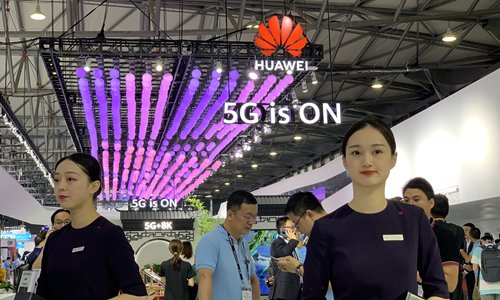HOME >> BUSINESS
Huawei must stay vigilant, invest in technology even if US lifts ban
By Chen Qingqing Source:Global Times Published: 2019/6/30 20:23:39
Company to invest in core technologies even if US lifts ban

Two employees welcome attendees to MWC19 Shanghai at the entrance to the Huawei exhibition hall. Photo: Chen Qingqing/GT
The US is considering lifting a ban on China's Huawei Technologies and allowing American companies to sell components to it as trade tension between China and the US eased, but industry representatives urged the Chinese technology giant to remain vigilant and keep investing in core technologies.
US President Donald Trump appeared to soften his tone on Huawei after the top leaders from the US and China met at the G20 summit in Japan on Saturday and reached a trade truce after a yearlong tit-for-tat tariff war. He suggested that US companies sell their equipment to Huawei, and said that allowing the transactions won't present a national emergency problem, CNN reported on Saturday.
The US Department of Commerce included Huawei and its affiliates on an Entity List in May, restricting the sale or transfer of US technologies to the Chinese company. However, it later issued a 90-day temporary license loosening restrictions and allowed US companies to make other arrangements.
"The US Entity List is not a death threat to us," Ren Zhengfei, founder of Huawei, was quoted as saying in a document released by the company on Saturday. He reiterated that the company is capable of self-supplying all of its high-end core chipsets, and it may need some time to find replacements for a small amount of components.
This is the first public statement that Huawei released after Trump said he will allow Huawei to continue buying products from US suppliers, which is widely considered as a major concession to China.
All the technical problems can be easily solved, which only requires time, the 76-year-old entrepreneur said. "For example, there are three components targeted by US clampdown… we're capable of finding alternatives or making them by ourselves," he said, noting that there is no question that can't be resolved.
"This is a victory for the first phase of the trade battle," Mei Xinyu, a veteran analyst close to the Ministry of Commerce, said during the weekend.
Loosening restrictions also buy Huawei some time to find alternatives and accelerate developments of its own technologies, analysts said.
"We hope Huawei and all its suppliers and contractors will work together to get through challenges in the coming two years," Mei said.
While some employees of Huawei were cheered by the US' softer tone, some senior executives warned that the company's long-term growth and prosperity should not rely on the mercy of Washington but on its continuous focus on research and development.
"It should stay vigilant against capricious US demands," Xiang Ligang, director-general of the Beijing-based Information Consumption Alliance, told the Global Times.
For Huawei, it is more important to work on its own technologies ranging from operating systems to chipsets, he said. The US restrictions and the move to cut supply chains hurts American companies much more as many have been heavily relying on the Chinese market for their growing revenues.
It is unknown whether US authorities will review administrative measures that restrict US businesses from cooperating with Huawei, and it is also unknown what products are causing US national security problems, according to analysts.
Ren is confident about Huawei, which is now frequently described as a badly damaged fighter aircraft during WWII that keeps moving forward on its main course.
Newspaper headline: Huawei must stay vigilant: analysts